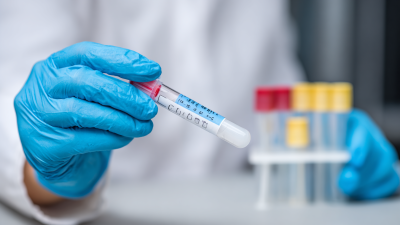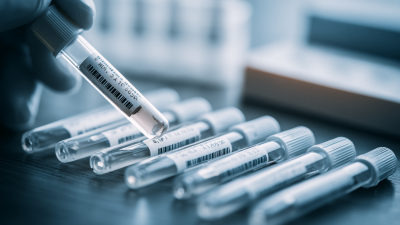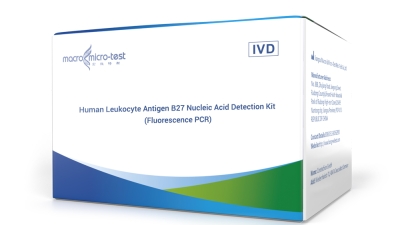Innovative Solutions for Accurate Helicobacter Pylori Antigen Detection in Gastrointestinal Health
Table of Contents
- Emerging Technologies in Helicobacter Pylori Antigen Testing
- Comparative Analysis of Traditional and Innovative Detection Methods
- The Role of Point-of-Care Testing in Gastrointestinal Health
- Benefits of Rapid Diagnostics in Helicobacter Pylori Management
- Innovative Biomarkers for Enhanced Detection Accuracy
- Future Directions in Antigen Detection for Gastrointestinal Disorders
- Exploring the Importance of HLA-B27 Nucleic Acid Detection in Diagnosing Autoimmune Conditions
- FAQS
- Conclusion
- Related Posts
 Helicobacter pylori—yeah, that spiral-shaped bacteria that likes to linger in your stomach lining—is a main culprit behind a bunch of gastrointestinal issues, like gastritis and ulcers. Making sure we accurately detect this bug is super important for proper diagnosis and treatment. Interestingly, some studies suggest that up to half of the folks worldwide might be infected with it. The market for these diagnostic tests is really picking up speed too, mainly because more people are dealing with gut problems and there's a growing craving for better, more innovative testing methods. One company that's really making waves in this space is Jiangsu Macro & Micro-Test Med-Tech Co., Ltd. — they started out in Beijing back in 2010. These guys are all about researching, developing, and producing cutting-edge detection tools and in vitro diagnostics. Thanks to their own innovative tech and solid manufacturing skills, they’re working hard to improve how accurately and quickly we can spot Helicobacter pylori, with the hope of helping improve stomach health worldwide.
Helicobacter pylori—yeah, that spiral-shaped bacteria that likes to linger in your stomach lining—is a main culprit behind a bunch of gastrointestinal issues, like gastritis and ulcers. Making sure we accurately detect this bug is super important for proper diagnosis and treatment. Interestingly, some studies suggest that up to half of the folks worldwide might be infected with it. The market for these diagnostic tests is really picking up speed too, mainly because more people are dealing with gut problems and there's a growing craving for better, more innovative testing methods. One company that's really making waves in this space is Jiangsu Macro & Micro-Test Med-Tech Co., Ltd. — they started out in Beijing back in 2010. These guys are all about researching, developing, and producing cutting-edge detection tools and in vitro diagnostics. Thanks to their own innovative tech and solid manufacturing skills, they’re working hard to improve how accurately and quickly we can spot Helicobacter pylori, with the hope of helping improve stomach health worldwide.
Emerging Technologies in Helicobacter Pylori Antigen Testing
You know, the latest tech in testing for Helicobacter pylori really is changing the game when it comes to managing gut health. It’s kinda crazy—more than half the world might have this infection, so catching it early and accurately is such a big deal. Old-school tests? They’re still useful, but they can sometimes miss the mark when it comes to sensitivity and precision. Luckily, new stuff like advanced biosensors and fancy molecular techniques are jumping in, showing they can deliver better, more reliable results. For instance, there was this study in the *Journal of Clinical Microbiology* talking about a brand new immunoassay that hit 95% sensitivity and 92% specificity—way better than the older methods, honestly.
What’s super cool is how portable, point-of-care testing gadgets are changing everything. They give quick results, so there’s no waiting around forever to find out if someone has H. pylori. The WHO’s stressing how crucial this is—especially in places where the infection’s really common—since catching it early can actually prevent serious stuff like stomach cancer down the line. Plus, according to a report from MarketsandMarkets, the market for H. pylori testing could hit around $1.5 billion by 2025, thanks to all these new tools and tech. It really highlights how we need to keep pushing forward in this area to help improve patient care and overall gut health—pretty exciting times, right?
Comparative Analysis of Traditional and Innovative Detection Methods
You know, in recent years, there’s been quite a leap forward in how we diagnose stomach issues, especially when it comes to detecting Helicobacter pylori, or H. pylori for short. The old-school methods like the urea breath test and endoscopic biopsy have been around forever and are still considered the go-to. But let’s be honest—they can be pretty invasive and uncomfortable for folks. The World Gastroenterology Organization even points out that these traditional tests have about an 85% accuracy rate, but they’re not perfect—things like patient cooperation and fancy equipment can sometimes get in the way.

Now, there are newer, smarter ways to do this. Tests like ELISA (that’s the enzyme-linked immunosorbent assay) and quick test kits have come onto the scene as pretty solid alternatives. Looking at some recent comparisons, these new methods are hitting sensitivities above 90%, which means they’re not only more accurate but also way more patient-friendly. Plus, with point-of-care testing, results come back faster, making the whole process smoother and saving healthcare systems some headaches. According to a study in the Journal of Clinical Gastroenterology, adopting these new techniques could mean getting diagnosed faster and starting treatment sooner—definitely a win for patients and doctors alike when it comes to managing H. pylori infections.
The Role of Point-of-Care Testing in Gastrointestinal Health
Point-of-care testing, or POCT, is really changing the game when it comes to gastrointestinal health. It allows doctors to quickly and accurately detect issues like Helicobacter pylori infections — a bacteria that can cause ulcers, gastritis, and other tummy troubles. You know, before, diagnosing these things meant sending samples off to a lab and waiting days for results, which can really slow down treatment. But now, with these new POCT techs, healthcare providers can get answers in just a few minutes. That means they can act fast and help patients get better sooner.

Here at Jiangsu Macro & Micro-Test Med-Tech Co., Ltd., we’re proud to be leading the charge with these innovative solutions. We started back in 2010, and ever since, our focus has been on creating top-notch in vitro diagnostic tests and detection tools. Our dedication to research and development means we’re able to produce reliable, efficient tests for H. pylori, helping clinics and hospitals improve their diagnostic processes. By making testing faster, easier, and more accurate right where the patient is, we give clinicians the tools they need to make quick, informed decisions. At the end of the day, it’s all about helping people get better care, faster, especially when it comes to gut health issues.
Benefits of Rapid Diagnostics in Helicobacter Pylori Management
Hey, have you heard about how rapid tests for Helicobacter pylori, or H. pylori for short, are really changing the game when it comes to gastrointestinal health? It’s pretty wild—this infection is linked to a bunch of stomach issues, like peptic ulcers and even gastric cancer. Based on WHO data, about half of the world’s population is affected—that’s huge! In the past, diagnosing H. pylori meant going through invasive procedures like endoscopy or biopsies, which can be pretty uncomfortable and also slow things down, so patients often had to wait longer for treatment. But now, with this new rapid antigen testing, doctors can get results in just minutes, which means treatment can start almost right away. It’s a total game-changer for everyone involved.
Using these quick tests actually makes a big difference—not just for patient comfort, but also when it comes to outcomes. Research shows that catching H. pylori early with these tests can boost the chances of successfully getting rid of the infection by around 30%, especially if treatment begins soon after diagnosis. Plus, these tests can often be done right in outpatient clinics, which cuts down on healthcare costs and makes the whole process smoother. As the healthcare system gets busier and busier, having smarter, faster ways to detect H. pylori really helps streamline everything, making sure patients get the care they need without unnecessary hassle. All in all, these innovations are really making a positive impact on how we manage gut health—and everyone’s happier for it.
Innovative Biomarkers for Enhanced Detection Accuracy
Detecting Helicobacter pylori, the bacteria that's a major culprit behind stomach problems like ulcers and even gastric cancer, has really taken a big leap forward thanks to new biomarkers. You know, for a while, traditional tests weren’t all that reliable—accuracy could drop down to around 70%, which is pretty okay but definitely room for improvement. So, researchers started looking into fresh diagnostic tools. Now, biomarkers like peptidoglycan and specific antibodies are showing a lot of promise because they can spot the infection more accurately and with greater sensitivity.
For example, a 2022 study published in the Journal of Gastroenterology mentioned that using cutting-edge peptide-based biomarkers can push detection accuracy beyond 90%. That's a pretty big deal because catching the infection early and accurately really makes a difference when it comes to effective treatment. Plus, being able to diagnose properly helps reduce the chances of serious complications down the line. On top of that, advances in molecular techniques like PCR and next-generation sequencing are giving us even deeper insights into H. pylori's genetic stuff, which means doctors can tailor treatments more precisely. Overall, these innovations are really improving how we handle gastrointestinal health—and that’s exciting for both patients and practitioners alike.
Future Directions in Antigen Detection for Gastrointestinal Disorders
Detecting Helicobacter pylori (H. pylori) antigens plays a pretty big role in diagnosing various gastrointestinal issues. As research keeps moving forward, it's really important to look into new and better ways to make this detection more accurate and efficient. In the future, we might see the use of snazzy biosensors and nanotech—things that can give faster results and pick up even tiny amounts of the bacteria. These kinds of tech could even lead to point-of-care tests, meaning we can get quick feedback right in the doctor’s office, which could really make a difference in how we manage related health problems.
And there's more—integrating AI into the whole detection process? That’s an exciting direction to explore. AI can sift through complex data, sometimes spotting new biomarkers linked to H. pylori infections. That doesn’t just mean better tests; it could also open doors for personalized treatments tailored to each patient’s unique profile. Overall, focusing on these innovative approaches could really help with early detection and better treatment of GI disorders caused by H. pylori, leading to better outcomes for patients all around.
Exploring the Importance of HLA-B27 Nucleic Acid Detection in Diagnosing Autoimmune Conditions
The detection of HLA-B27 nucleic acid plays a pivotal role in the diagnosis of various autoimmune conditions, particularly spondyloarthritis. Understanding the importance of identifying specific HLA-B27 subtypes can significantly enhance the accuracy of diagnosis, leading to more tailored treatment options for affected individuals. The HLA-B27 antigen is prevalent in many patients suffering from autoimmune disorders, and detecting its presence can provide critical insights into the underlying causes of these conditions.
Utilizing a qualitative detection kit designed for the human leukocyte antigen subtypes HLA-B*2702, HLA-B*2704, and HLA-B*2705 offers a streamlined approach for healthcare professionals. By enabling precise identification of these specific subtypes, the kit allows for effective screening and diagnosis of autoimmune diseases. This enhanced diagnostic capability is essential not only for guiding treatment decisions but also for improving patient outcomes through early intervention and personalized care strategies. With autoimmune diseases often presenting complex symptoms, the focus on HLA-B27 nucleic acid detection is a significant advancement in understanding and managing these challenging conditions.
FAQS
: Helicobacter pylori (H. pylori) is a bacterium linked to various gastrointestinal issues, including ulcers and gastric cancer. Early detection is critical because it allows for timely treatment, which can prevent serious complications.
Traditional testing methods have limitations in sensitivity and specificity, which can result in inaccurate diagnoses and delays in treatment.
Emerging technologies, such as innovative biosensors and molecular techniques, enhance diagnostic accuracy, with some studies showing sensitivities of 95% and specificities of 92%, surpassing traditional tests.
Point-of-care testing (POCT) refers to portable diagnostic devices that provide rapid results, significantly reducing the time from sample collection to diagnosis, thereby facilitating timely medical interventions.
The World Health Organization highlights the importance of rapid testing in regions with high H. pylori prevalence to ensure timely intervention and reduce the risk of long-term health complications.
Innovative biomarkers like peptidoglycan and specific antibodies are being researched to improve detection accuracy to over 90%, compared to traditional methods with accuracy as low as 70%.
The company develops advanced in vitro diagnostic reagents and detection technologies, focusing on reliable and efficient H. pylori tests that enhance diagnostic capabilities and improve patient care.
Molecular techniques, such as PCR and next-generation sequencing, provide detailed insights into H. pylori's genetic makeup, informing tailored treatment approaches and improving patient outcomes.
The H. pylori testing market is projected to reach $1.5 billion by 2025, driven by advancements in testing technologies and the growing need for effective gastrointestinal health management.
Conclusion
When it comes to improving gut health, accurately detecting Helicobacter pylori antigens has really become a hot topic in recent research and development. In this blog, I wanna take a look at some of the coolest new tech out there for detecting these antigens, especially how they’re beating the old-school methods. You’ll notice a big shift towards quick, point-of-care tests — which is a game-changer because it means faster diagnosis and better management of infections.
We’ll also talk about some new biomarkers that are making detection more precise, helping to push the whole field forward. At Jiangsu Macro & Micro-Test Med-Tech Co., Ltd., we’re really passionate about R&D and creating innovative diagnostic tools. It’s all about staying ahead of the curve and helping folks fight off Helicobacter pylori, so they can stay healthier overall.
Related Posts
-

Understanding the Cost Factors for Wholesale Fish Blood Testing in Your Business
-

The Future of Best tt3 Innovations in Efficiency and Performance
-

5 Key Benefits of Using Influenza A&B Test for Early Diagnosis
-

7 Reasons Why Choosing a Wholesale Rapid Diagnostic Test for Dengue Manufacturer Matters
-

Exploring the Features and Applications of Cervical Cancer Self Test Kits: A Comprehensive Guide
-

Chinese Excellence in Manufacturing Best Malaria PV Driving Global Supply Chain Solutions


